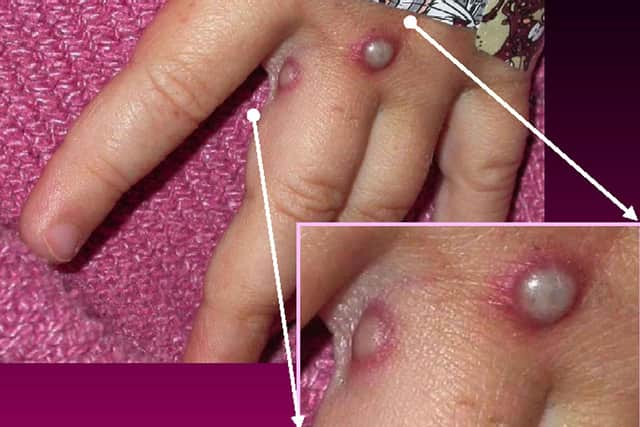Monkeypox in Blackpool: What is it, how does it spread and what are the symptoms you should look for
and live on Freeview channel 276
Monkeypox was made a notifiable disease on June 7, 2022, meaning doctors must report any suspected cases and laboratories must report all confirmed cases.
The two suspected cases in Blackpool were reported in the week ending June 19, 2022.
Advertisement
Hide AdAdvertisement
Hide AdHere is everything you need to know about the viral infection, from symptoms to treatment and much more.


How is monkeypox transmitted?
Monkeypox can be spread when a person comes into close contact with an infected animal, human or contaminated material.
Rodents are believed to be primary animal for transmission to humans, however, the virus has not been detected in animals in the UK.
How is the virus be spread person-to-person?
While the spread of the virus person-to-person is rare, coming into contact with contaminated clothes or bed linen, direct contact with skin lesions or scabs and the coughing or sneezing of someone with monkeypox can spread the infection.
What are the symptoms of monkeypox?
Advertisement
Hide AdAdvertisement
Hide AdSymptoms of monkeypox can include, fever, headache, muscle aches, backache, swollen lymph nodes, chills, exhaustion and a rash.
How long before symptoms appear and how long will you be contagious for?
The time between contact with an infected person and symptoms first appearing can be anywhere between 5 and 21 days. Within 1 to 5 days after the appearance of fever, a rash often beginning on the face, will appear and spread to other parts of the body.
Over time the rash will form scabs which will eventually fall off – the infected person will remain infectious until all the scabs have fallen off leaving intact skin underneath (The scabs may also contain infectious virus material).
What should you do if you think you have monkeypox?
Clinical diagnosis of monkeypox can be difficult, as the virus is often confused with other infections such as chickenpox. The NHS advice is to stay at home and contact a local sexual health clinic, however, if you are unable to contact a clinic stay at home and call 111 for advice.
What treatment is available?
Advertisement
Hide AdAdvertisement
Hide AdTreatment for monkeypox is mainly supportive as the illness is usually mild for most of those infected – recover usually takes a few weeks without treatment
How serious is the virus?
Most patients recover within a few weeks and do not need treatment, but monkeypox can cause severe illness in some people – but as the infection can spread through close contact, it's important to isolate if you're diagnosed with it.
Why is it called monkeypox?
The disease was first discovered in monkeys kept for research in 1958. The first human case was recorded in 1970 in the Democratic Republic of Congo.
Is there a vaccine for monkeypox?
The UK Health Security Agency (UKHSA) said that in a bid to control the outbreak, some gay and bisexual men at higher risk of exposure to monkeypox should be offered the smallpox vaccine Imvanex.
Advertisement
Hide AdAdvertisement
Hide AdThe UKHSA said that the jab had been shown to be effective against monkeypox.
Its new strategy, endorsed by the Joint Committee on Vaccination and Immunisation (JCVI), suggests that eligibility would depend on a number of factors but a clinician may advise vaccination for someone who has a “recent history of multiple partners, participating in group sex, attending sex on premises venues or a proxy marker such as recent bacterial STI in the past year”.
The guidance does not recommend vaccination to the general population.
